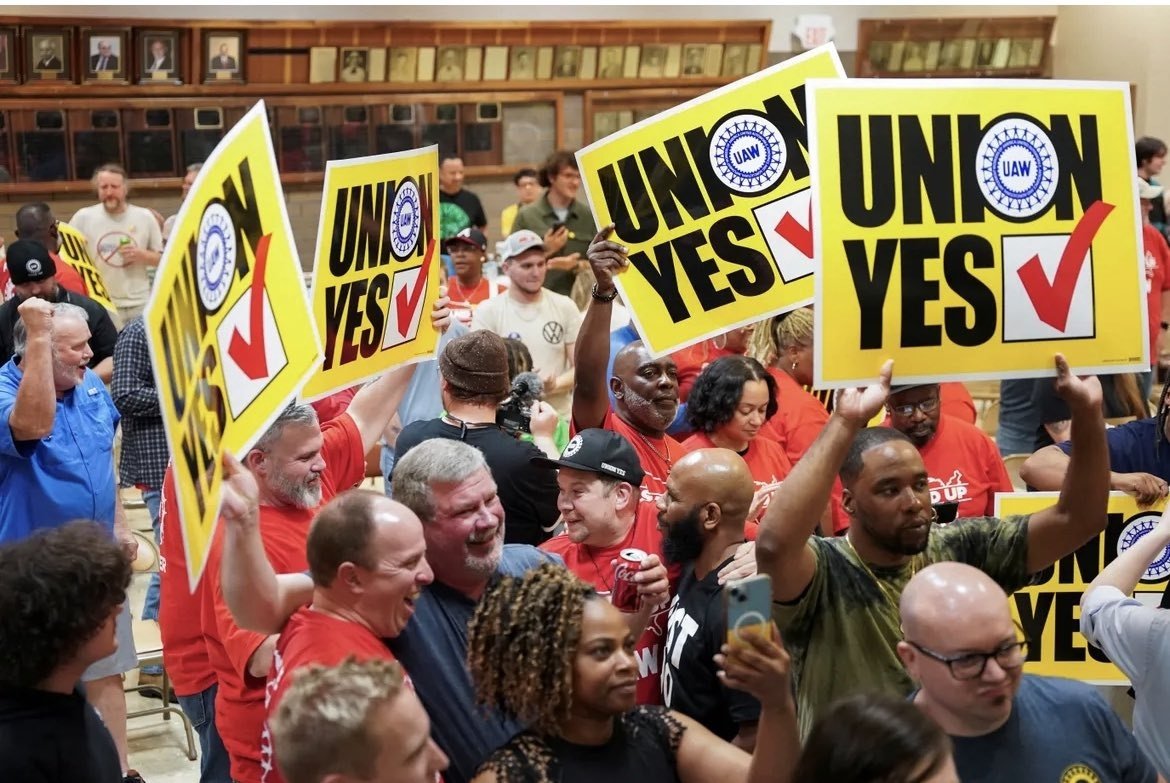Listen: UAW Moves Mountains in the South/Climate Crisis/Workers’ Memorial Day
Volkswagen workers in Tennessee have voted overwhelmingly to unionize with the UAW.
By Bob Hennelly
It’s the Moral Monday Labor Radio Hour’s special Earth Day Edition. On this week’s episode, we revisit one of Rev. Dr. William Barber’s most significant speeches on the climate crisis. We’re also reflecting on Worker Memorial Day, and exploring how the UAW is moving mountains in the deep south.
On Friday, by almost a three to one margin, Volkswagen autoworkers in Chattanooga, Tennessee made history when they voted to join the UAW — the first southern-based autoworkers outside of the Big Three to vote union. For a generation, so-called “right to work” states in the South have passed laws to make it impossible for workers to organize. Friday’s successful culminated a decade of organizing by the union.
“You all moved a mountain,” UAW President Shawn Fain told union activists on April 19. “Another thing we heard we can’t do, and we have done it because we stood together in solidarity, and we stood up for justice.”
Next month, 5,000 more autoworkers at Mercedes-Benz in Vance, Alabama, will get their chance to vote union. Since last year, when the UAW won their strategic stand-up strike against the Big Three automakers, which undid a generation of wage and benefit concessions, over 10,000 non-union autoworkers have signed union cards at Mercedes, Volkswagen, and Toyota.
But first, we kick off the first part of the show with an extended excerpt from Rev. Dr. William Barber’s 2015 speech at the Washington D.C. Rally for Moral Action on Climate Change. The speech coincided with Pope Francis visit to the U.S. and the Pope’s address to Congress, which addressed the urgency of the climate crisis.
“We must choose community and care over chaos and greed,” Rev. Barber warns.
We then ask Rev. Dr. Liz Theoharis, co-chair of the Poor People’s Campaign and the executive director of the Kairos Center at Union Theological Seminary, to assess where we are almost a decade after Rev. Barber’s speech. She’s joined by Rachel Dawn Davis, with the New Jersey Poor People’s Campaign, and Waterspirit — a non-profit that links community action, social justice and the environment.
The guests discuss a peer reviewed global public health study estimating that there were over five million excess deaths, deaths that could have been prevented, that are attributable to chronic exposure to the ambient air pollution generated by the burning of fossil fuels. And we know that’s a fact of life and death in our nation’s poorer communities where so much of our most toxic infrastructure is built.
We also welcome Charlene Obernauer, executive director of NYCOSH, and Brendan Griffith, chief of staff at the NYC Central Labor Council, AFL-CIO. Both NYCOSH and the CLC are sponsoring the commemoration of Workers’ Memorial Day later this week to honor all of the workers who have died or suffered life altering injuries on the job in the previous year.
Reports from the federal government show 5,500 fatal workplace injuries in 2022, a 5.7 percent increase over the previous year. “That means in 2022, that a worker died from a work related injury every 96 minutes,” Obernauer says.
Last year, the AFL-CIO reported the cost of job injuries and illnesses was enormous — estimated at $174 billion to $348 billion a year. The federal government, however, spends just $3.99 per worker on workplace safety compliance. "Underreporting is widespread" with fewer than 2,000 state and federal inspectors to inspect and monitor the country's almost 10.8 million workplaces. As a consequence, the AFL-CIO reports, with only one inspector for every 77,334 workers, it would take 190 years for OSHA to inspect each site over which it has jurisdiction.
Griffith discusses the growing impact of violence on the job and describes how the proposed Retail Worker Safety Act, being promoted by the RWDSU, takes a holistic approach based on the lived experience of union members who were on hand during the May 2022 race based mass shooting at the Topps grocery store in Buffalo that left ten shoppers dead.
“We’ve seen increases it seems, in every industry. Whether it’s public facing or not, there are more and more instances of workplace violence,” Griffith says. “And RWDSU is really getting out there and trying to say, what can employers do to help protect their workers? That would really make a significant difference.”
Leading up to the election, we are working in partnership with Repairers of the Breach, highlighting efforts by the moral movement and Poor People's Campaign, which grew out of the North Carolina Forward Together Moral Monday Movement that supports the living wage campaigns led by the UAW, RWDSU, the CWA and the SEIU throughout the South. Over the next several months, we will cover the non-partisan voter mobilization efforts led by the Poor People’s Campaign’s 40 state chapters and the union movement in all 50 states leading up to the pivotal 2024 election.
Listen to the entire show below:

